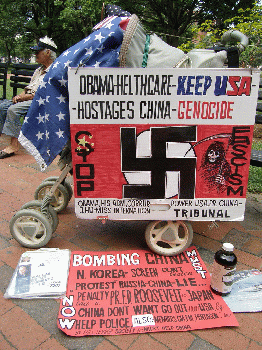From Grayzone
After convincing itself Vietnam would grant it access for missile bases against China, the Pentagon got a hard dose of reality.
When the Pentagon began gearing up for a future war with China in 2018, Defense Department officials quickly realized that they needed access to Vietnamese territory for troops armed with missiles to hit Chinese ships in a US-China conflict. So they initiated an aggressive campaign to lobby the Vietnamese government, and even Communist Party officials, in the hope that they would eventually support an agreement to provide them the permission.
But a Grayzone investigation of the Pentagon's lobbying push in Vietnam shows what a delusional exercise it was from its inception. In a fit of self-deception that highlighted the desperation behind the bid, the US military ignored abundant evidence that Vietnam had no intention of giving up its longstanding, firmly grounded policy of equidistance between the United States and China.
Vietnam as a key base in US war strategyBetween 2010 and 2017, China developed intermediate-range missiles capable of hitting American bases in Japan and South Korea. To counter that threat, the Pentagon and military services began working on a new strategy in which US Marines, accompanied by an array of missiles, would spread out over a network of small, rudimentary bases and move continuously from one base to another.
Vietnam was the logical choice for such sites. Australia and the Philippines publicly ruled out hosting US missiles capable of hitting China, and South Korea was considered unlikely to agree. Indonesia and Singapore were too economically dependent on China to be interested.
But as Chris Dougherty, the former senior advisor to the deputy assistant secretary of defense for strategy and force development, who had written large parts of the 2018 National Defense Strategy, told the Military Times last September, "Vietnam has some wonderful geography. You can have good external lines against the Chinese." Pentagon strategists also knew that Vietnam had soundly defeated a poorly conceived Chinese invasion in 1979 designed to punish the Vietnamese for their ties with the Soviet Union.
The Pentagon's focus on Vietnam began when then-Defense Secretary James Mattis visited Vietnam in both 2017 and 2018, meeting several times with Defense Minister General Ngo Xuan Lich, who had previously visited him in Washington. During his January 2018 visit, Mattis waxed enthusiastically about the future of US-Vietnam cooperation, calling the two countries "like-minded partners."
In April 2019, the commander of the US Indo-Pacific Command, Adm. Philip S. Davidson, visited Hanoi and Ho Chi Minh City during a four-day trip. Mattis's successor, Mark Esper, went even further in a November 2019 trip, meeting not only with the defense minister, Lich, but with executive secretary of the Communist Party, Tran Quoc Vuong, as well.
Officials were pleased with what they believed was a breakthrough for the Pentagon, despite the Vietnamese Defense Ministry's abrupt cancellation of 15 previously planned "defense engagements" with the United States without public explanation the previous month.
In the Defense Department's pursuit of Vietnam's active involvement in its new war strategy, however, US military brass were ignoring the fundamental fact that the Communist Party of Vietnam and military leadership were not going to budge from the strategic policy to which it had been publicly committed for two decades.
The policy was summed up in three fundamental principles: no military alliances, no aligning with one country against another, and no foreign military bases on Vietnamese soil. The Vietnamese commitment to those "three noes," first made public in a national defense white paper published in 1998, was repeated in successive white papers in 2004 and 2009.
Those principles clearly ruled out the kind of military cooperation that the Pentagon sought from Vietnam. But there was apparently too much at stake for top Pentagon officials to let that reality stand in the way of their enthusiasm.
The Defense Department's main corporate research arm, the RAND Corporation, which was heavily invested in the idea of a viable new military strategy for war with China, was equally unwilling to acknowledge the truth. In January 2019, Derek Grossman, RAND's specialist on Vietnamese defense policy, publicly reassured the policymakers that Hanoi was not really bound by any of those three "three noes."
(Note: You can view every article as one long page if you sign up as an Advocate Member, or higher).






